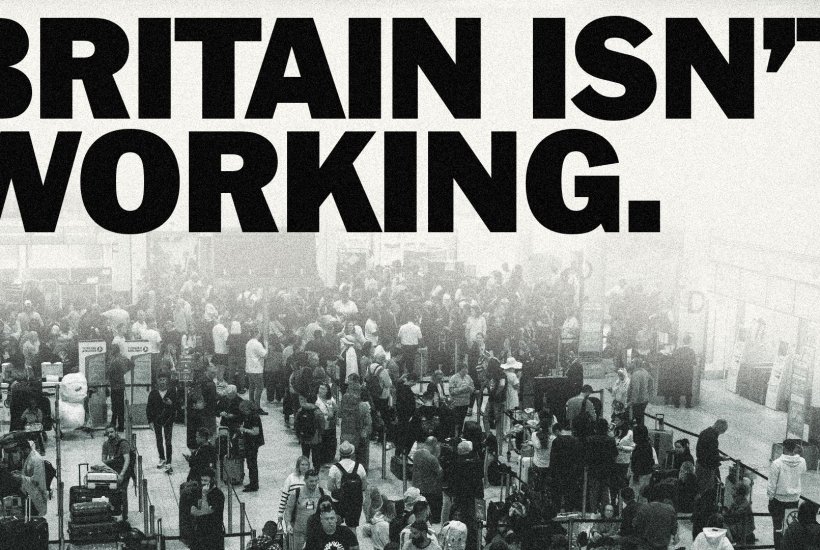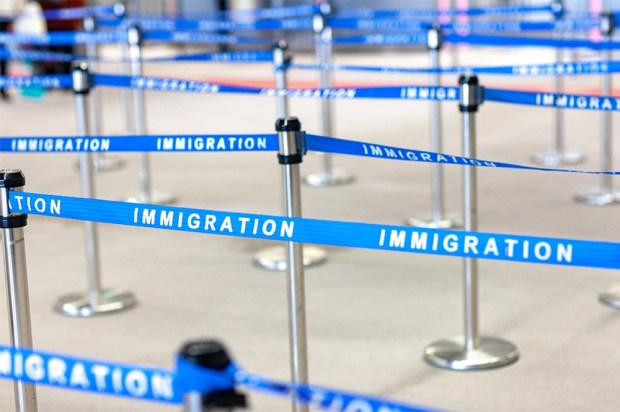No. 10 quickly asserted that the meltdown at National Air Traffic Services was a technical issue rather than a cyber attack. This was presumably meant to be reassuring. It is anything but. It speaks, once more, of a Britain with creaking infrastructure, where national paralysis has become a regular occurrence. The highest tax revenues in peacetime history have not created a properly functioning country.
The breakdown was caused by a single mis-filed flight plan. That such havoc can result from one trivial event does little credit to the organisation entrusted with our airspace. This week’s event may not be a cyber attack, but hostile states and organisations will be taking note. If it is so easy to bring air traffic to a virtual standstill, then we lay ourselves open to the kind of attack that is likely to be an integral part of modern warfare.
The government has been too lax on the issue of cyber security for far too long. While it was brought up in a review of defence policy during Dominic Cummings’s brief time as Boris Johnson’s chief adviser, momentum has been lost. It took several years for the government to accept that incorporating Chinese-made equipment in our broadband networks was a bad idea. This was in spite of the US warning that it would be more circumspect about intelligence sharing with Britain if our internet was vulnerable to attack.
However, this week’s events raise a wider issue about infrastructure investment. The airline industry presents a particular difficulty for the government, since mass air travel is incompatible with net zero commitments.
Its answer to the proposed new runway at Heathrow (which was first mooted in 1946) was initially to prevaricate, handing the matter to a commission led by Sir Howard Davies. Then, when the commission came down in favour of expansion in 2015, the government gave its lukewarm support. Now, it doesn’t look as if the new runway will be built.
Three years ago the courts ruled that the runway would be in breach of the government’s climate commitments made at the 2015 Paris climate accords. The Supreme Court overturned this decision only months later. Since then, progress has stalled. Other signatories to the Paris agreement have continued building new airports and runways. Yet like so much infrastructure in Britain today, demands for a third runway remain unfulfilled.
In her memoirs, to be published on 14 September, Theresa May cites the net zero commitment as one of the achievements she would most like to be remembered for. This sums up the problem of the modern Tory party. Anyone can set a target without first working out how to get there, or how much it will cost. But to do that is the epitome of the vain, unserious politics that May takes aim at in her book. May’s outlook is sadly bereft of any sense of what Conservatism is – or should be.
Perhaps modern British Conservatism can be best described as lurching from one crisis to another, while leaving a pile of unsolved problems. Voters might be more prepared to accept higher taxes even than those imposed by the Labour chancellor Denis Healey if they could see a visible return on their investment. But over 13 years, a succession of Tory prime ministers have squandered what little capital they had on white-elephant projects such as HS2. At the same time, investment in education has been limited. That has meant many pupils have been left in dilapidated and substandard buildings.
Rishi Sunak has been more willing than most to at least address the scale of the problems, and to admit that quick fixes are not always possible. But he is also failing to answer the bigger question of why we pay so much tax and receive so little. In large part, the answer lies in welfare dysfunction. New figures slipped out last month show that the number of working-age people on out-of-work benefits has hit 5.4 million – and is still rising. Much of it is in the form of sickness benefit, which does not show up in the unemployment figures.
Britain is the only country in Europe that has not managed to return its workforce to pre-pandemic levels. The generous furlough system was supposed to facilitate a quick bounce-back. Instead, it has given rise to the worst workforce recovery of any major economy. One in five people in Manchester, Birmingham and Liverpool are on out-of-work benefits. All this while each of these great cities suffers a worker-shortage crisis which ministers are remedying through mass migration – issuing more work visas than at any time in our history.
But using migration to cover up an employment crisis is yet another short-term solution that is certain to create big longer-term problems. Issues will present themselves soon enough, from housing shortages and a lack of hospital beds to overwhelmed sewage systems.
May’s memoir is called The Abuse of Power. Her net zero strategy stands as a case study of this: what happens when grandiose targets are declared without a strategy or proper costing. It is what happens when long-term thinking is replaced by a vague hope that something will turn up. The country deserves better.
Got something to add? Join the discussion and comment below.
Get 10 issues for just $10
Subscribe to The Spectator Australia today for the next 10 magazine issues, plus full online access, for just $10.
You might disagree with half of it, but you’ll enjoy reading all of it. Try your first month for free, then just $2 a week for the remainder of your first year.














Comments
Don't miss out
Join the conversation with other Spectator Australia readers. Subscribe to leave a comment.
SUBSCRIBEAlready a subscriber? Log in